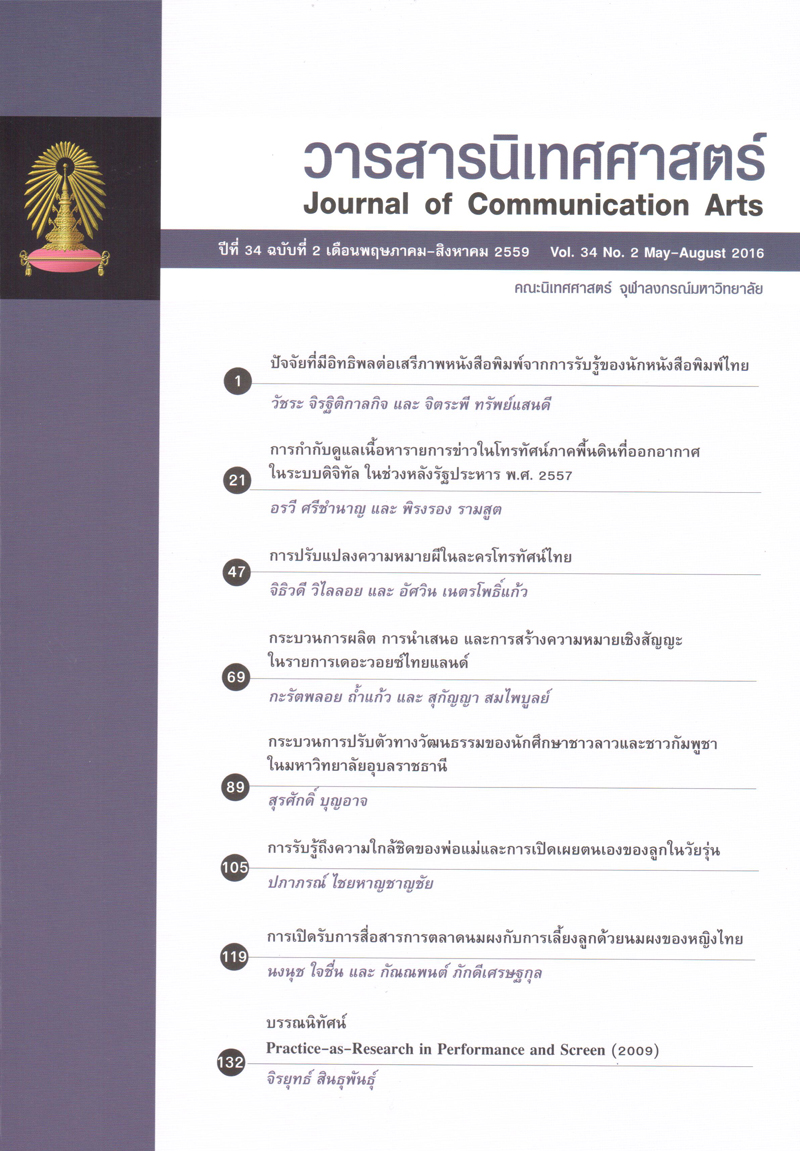การเปิดรับการสื่อสารการตลาดนมผงกับการเลี้ยงลูกด้วยนมผงของหญิงไทย
Main Article Content
Abstract
การสื่อสารการตลาดเป็นเครื่องมือของอุตสาหกรรมนมผงในการส่งเสริมการขายนมผง การศึกษานี้จึงมีวัตถุประสงค์เพื่อศึกษาความสัมพันธ์ระหว่างการเปิดรับการสื่อสารการตลาดของอุตสาหกรรมนมผง กับมายาคติ ทัศนคติ และพฤติกรรมการเลี้ยงลูกด้วยนมผงของหญิงไทย โดยใช้แบบสอบถามตอบเองให้กลุ่มตัวอย่างที่เป็นสตรีวัยเจริญพันธุ์มีเชื้อชาติและสัญชาติไทย จำนวน 865 คน เก็บรวบรวมข้อมูลจาก 4 จังหวัดของประเทศไทย และทดสอบความสัมพันธ์ระหว่างการเปิดรับการสื่อสารการตลาดของอุตสาหกรรมนมผงกับมายาคติ ทัศนคติ และพฤติกรรมการเลี้ยงลูกด้วยนมผงของหญิงไทยโดยใช้สถิติการถดถอยโลจิสติก
ผลการศึกษา พบว่า อุตสาหกรรมนมผงใช้การสื่อสารการตลาดหลากหลาย เช่น การโฆษณา การตลาดทางตรง และการใช้พนักงานขาย และการสื่อสารการตลาดของอุตสาหกรรมนมผงส่งผลกระทบต่อมายาคติ ทัศนคติ และพฤติกรรมการเลี้ยงลูกด้วยนมผงของหญิงไทย โดยกลุ่มตัวอย่างที่มีการเปิดรับการสื่อสารการตลาดของอุตสาหกรรมนมผงบ่อยหรือทุกวัน จะมีมายาคติด้านความรู้เกี่ยวกับนมผงน้อยกว่า กลุ่มตัวอย่างที่มีการเปิดรับบ้างหรือไม่เคยเปิดรับเลย ถึง 1.4 เท่า และผู้หญิงที่มีทัศนคติชื่นชอบการสื่อสารการตลาดของอุตสาหกรรมนมผง จะมีโอกาสเลี้ยงลูกด้วยนมผง มากกว่าผู้หญิงที่มีทัศนคติไม่ชื่นชอบการสื่อสารการตลาดของอุตสาหกรรมนมผง ถึง 2.3 เท่า จะเห็นได้ว่า การเปิดรับการสื่อสารการตลาดของอุตสาหกรรมนมผง เป็นการสร้างมายาคติที่บิดเบือนความจริงให้แก่หญิงไทย ดังนั้น ภาครัฐหรือหน่วยงานที่เกี่ยวข้องควรออกกฎหมายหรือมาตรการควบคุมการสื่อสารการตลาดของอุตสาหกรรมนมผง เพื่อปกป้องและคุ้มครองสุขภาพของแม่และเด็กต่อไป
The Exposure of Marketing Communication on Thai Women’s Breast Milk Substitutes Behavior
Marketing communication is a tool in which baby formula industry uses to promote its products. The objectives of this study were to explore baby formula marketing communication exposure among Thai women and their associations with baby formula-related myth, their attitudes, and their formula feeding behaviors. Self-administered questionnaires were provided for data collecting from 865 Thai females at reproductive age in four provinces of Thailand. The study used logistic regression analysis to identify any associations.
The study found that baby formula industry used various marketing communication such as advertisement, direct marketing, and personnel selling and there are associations between baby formula marketing communication, baby formula-related myth, Thai women’s attitudes and formula uses. Furthermore, the samples that were frequently exposed to baby formula marketing communication strategies were aware of reality of formula 1.4 time less than those who were hardly or non-exposed, and women who had positive attitude towards baby formula marketing communication used formula 2.3 time higher than those who had negative attitude. This study concludes that baby formula marketing communication used by the industry created myth in order to mislead Thai women. Therefore, government or related agencies should seriously develop the law to control babies’ formula marketing communication in order to protect the health of mother and infant.


